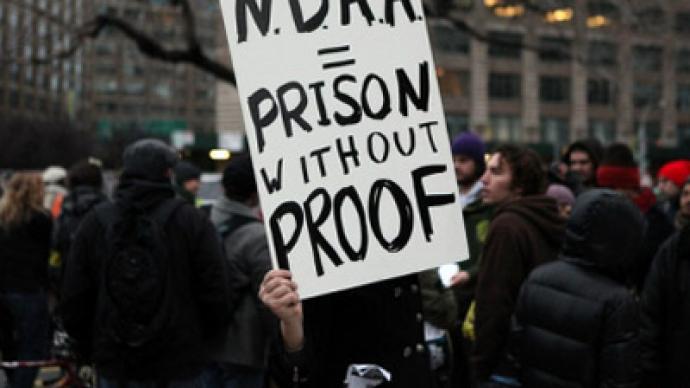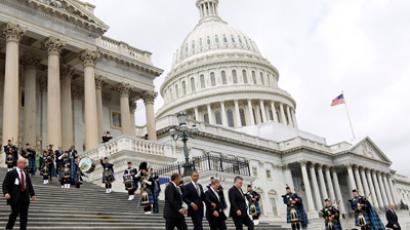NDAA 2013: White House and Senate fight over indefinite detention

A reprise of last year’s war in Washington over whether or not Americans can be indefinitely detained without trial is occurring already. The Senate has approved a measure that voids parts of the 2012 NDAA, but the White House says they plan to veto.
Just hours before lawmakers in the US Senate overwhelming voted in favor of an amendment that will challenge controversial provisions in the National Defense Authorization Act, or NDAA, the Obama administration cited seemingly unrelated sections of the annual Pentagon spending bill as the reasoning behind a planned veto.
Last year, staffers working directly under Pres. Barack Obama said they’d recommend the commander-in-chief reject the 2012 NDAA because of certain provisions that provided the Executive Branch the power to indefinitely hold any US citizen in military prison for mere suspicious of ties to terrorism. Despite his office’s assurance that the NDAA would not be authorized as written, Pres. Obama signed his name to the bill on December 31, 2011, all the while acknowledging that he had reservations about the sections that stripped away habeas corpus from US citizens. Even still, the White House has been adamantly fighting in federal appeals court for the right to continue having the ability, despite a district judge having already called that part of the act unconstitutional.
Now as next year’s bill is being scrutinized in Congress, lawmakers in the Senate this Thursday agreed to pass by a vote of 67 to 29 a measure sponsored by Sen. Dianne Feinstein (D-California) that applied civil liberty protections to US persons who could be detained under the current NDAA.
"An authorization to use military force, a declaration of war or any similar authority shall not authorize the detention without charge or trial of a citizen or lawful permanent resident of the United States apprehended in the United States, unless an Act of Congress expressly authorizes such detention,” the senator’s amendment reads.
"I know this is a sensitive subject, but I really believe we stand on the values of our country, and the value of our country is justice for all," she told her colleagues on the Senate floor.
Sen. Rand Paul (R-Kentucky), an avid critic of the NDAA, said the passing of Feinstein’s amendment has signaled a “victory” in a year-long effort to keep indefinite detention without charge or trial off the books.
“Let’s don't play any games with any aspect and really believe that any Supreme Court in the United States, whether appointed by a Republican or a Democrat, is going to say that an American citizen does not have a right to trial by jury,” he said.
Now with the Senate’s approval of Sen. Feinstein’s amendment, the indefinite detention provisions from the 2012 NDAA stand a chance of being stripped off next year’s bill. Citing completely unrelated reasons, though, the Obama White House said on Thursday that the president is not likely to accept the defense bill in its current form.
According to the White House, the impetus behind Pres. Obama’s reluctance this time around isn’t that a veto will reauthorize his ability to imprison his own citizens without charge. Instead, the administration argues that separate provisions on the current draft of the NDAA would hinder Pres. Obama’s efforts to relocate the foreign terror suspects currently held at the United States’ military prison at Guantanamo Bay, Cuba.
“When he signed past versions of this legislation, the president objected to the restrictions carried forward by section 1031, promised to work towards their repeal, and warned the Congress that the restrictions on transferring detainees from Guantanamo Bay to foreign countries would in certain circumstances interfere with constitutional responsibilities committed to the Executive Branch,” reads a statement published this week from the White House Office of Management and Budget.
"Since these restrictions have been on the books, they have limited the Executive's ability to manage military operations in an ongoing armed conflict, harmed the country's diplomatic relations with allies and counterterrorism partners and provided no benefit whatsoever to our national security.”
Under the latest draft of the 2013 NDAA, the Pentagon will be prohibited from using governmental funds to relocate Gitmo detainees to a new facility in the US. The president vowed on the campaign trail leading up to the November 6 election that he would close the infamous military prison under a second term in office, but that promise was one he also waged back in 2008 with so far no sign of following though. Now a renewed interest in shutting-down Gitmo is being used by the White House to justify the administration’s refusal to accept a bill that challenges the draconian legislation that he signed into law and has fought adamantly in appeals court to uphold since.
Sen. Lindsey Graham (R-South Carolina), a key figure in getting the indefinite detention provision added to the 2012 NDAA, insisted this week on renewed authorization of that clause while also advocating the continued operation of Guantanamo. Defending America’s current powers to prosecute suspected terrorists by any means necessary, Sen. Graham said both indefinite detention and a prison at Gitmo need remain options on the table for the sake of advancing American dominance in overseas military efforts.
"When you're fighting a war, the goal is not to prosecute people, the goal is to win,"Grahamsaid. "How do you win a war? You kill them, you capture them and you interrogate them to find out what they're up to next."
“Simply stated, the American people don’t want to close Guantanamo Bay, which is an isolated, military-controlled facility, to bring these crazy bastards that want to kill us all to the United States,” he told fellow senators during Thursday’s vote. “Most Americans believe that the people at Guantanamo Bay are not some kind of burglar or bank robber. They are bent on our destruction. And I stand with the American people that we’re under siege, we’re under attack and we’re at war.”
Even if the White House was to agree with Sen. Graham’s take, Pres. Obama’s current plans call for ending the only war the United States is officially fighting — the 11-year-long operation in Afghanistan — by 2014. Just this week, however, it was revealed that as many as 10,000 US troops may stay station in Afghanistan for the undeterminable future to assist in so-called stabilization efforts.
On his part, Sen. Rand Paul rebuffed Sen. Graham’s comments by remarking, “Since I know this record of this debate will be widely read, that I want to make formal objection to the ‘crazy bastards standard.’”
“I don’t really think that if we’re going to have a ‘crazy bastards’ standard that we shouldn’t have a right to trial by jury, because if we’re going to lock up all the crazy bastards, for goodness sakes, would you not want, if you’re a crazy bastard, to have a right to trial by jury?” said Paul.
Before Sen. Feinstein’s amendment was approved this week, the most recent revision of the 2013 NDAA including a passage reaffirming every American’s right to habeas corpus. The complete defense bill must successfully pass through Congress before Pres. Obama can sign it. In all, the bill outlines spending for the Department of Defense during the next fiscal year and is crucial for figuring out expenses for the entire military complex. Presidents Carter, Reagan, Clinton, and George W. Bush have each vetoed an NDAA during their administrations.














